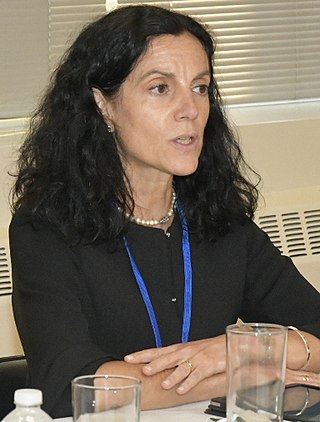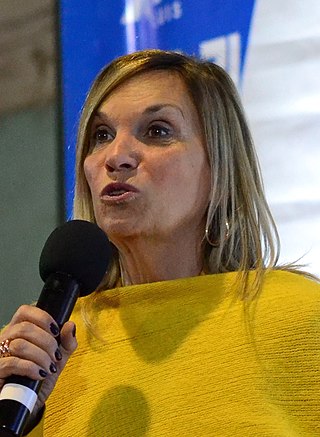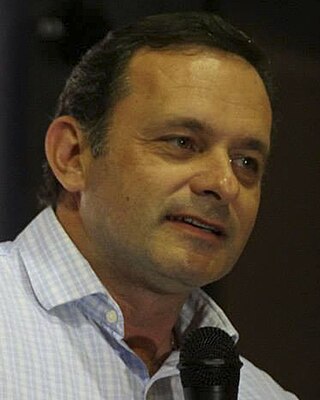
Luis Alberto Lacalle de Herrera,, is a Uruguayan politician and lawyer who served as the 36th president of Uruguay from 1990 to 1995. A member of the National Party, he previously served as National Representative from 1972 to 1973, and as Senator of the Republic from 1985 to 1990.

Jorge Washington Larrañaga Fraga was a Uruguayan lawyer and politician of the National Party (PN) who served as Minister of the Interior from 1 March 2020 until his death. He previously served as Intendant of Paysandú from 1990 to 1999, as well as a Senator between 2000 and 2020.

Luis Alberto Aparicio Alejandro Lacalle Pou, is a Uruguayan politician and lawyer, serving as the 42nd president of Uruguay since 2020.

Sergio Abreu Bonilla is a Uruguayan lawyer, diplomat, politician, musician and professor of International Law of the National Party (PN). Since February 15, 2020, he has served as Senator of the Republic.

Javier Fernando García Duchini is a Uruguayan politician of the National Party, currently serving as Senator of the Republic since 2024. He previously served as Minister of National Defense from 2020 to 2024 under Luis Lacalle Pou, and as National Representative on several occasions.

General elections were held in Uruguay on Sunday, 27 October 2019 to elect the President and General Assembly. As no presidential candidate received a majority in the first round of voting, a runoff election took place on 24 November.

Azucena María Arbeleche Perdomo is a Uruguayan professor, economist and civil servant who serves as Minister of Economy and Finance of Uruguay since March 1, 2020 under president Luis Lacalle Pou, being the first woman to hold that office.

Beatriz Argimón Cedeira is a Uruguayan politician and notary of the National Party currently serving as the 18th Vice President of Uruguay since 1 March 2020, being the first woman to be elected in that position.

Cabildo Abierto is an Uruguayan political party founded in 2019. The party is described as right-wing populist, nationalist and conservative, as well as mostly characterized as far-right on the mainstream political spectre. However, it defines itself as Artiguist and is referred to as a third position party by some sources. It participated for the first time in an election the same year of its foundation, obtaining 11.04% of the votes, three senators and eleven representatives. It is led by Guido Manini Ríos, descendant of a traditional Colorado Party family and former Commander in Chief of the Army.

The Multicolor Coalition is a big tent political coalition formed for the ballotage in Uruguay in 2019.

Álvaro Luis Delgado Ceretta is a Uruguayan veterinarian and politician of the National Party (PN), who served as the 18th Secretary of the Presidency of the Republic from 2020 to 2023. He also previously served as National Representative from 2005 to 2015, as well as Senator from 2015 to 2020. He is a candidate in the 2024 National Party presidential primaries for president of Uruguay in the 2024 general election.

Sergio Daniel Puglia Silva is a Uruguayan chef, restaurateur, presenter and businessman.
Pablo Bartol is an Uruguayan social entrepreneur, lecturer and politician who served as Minister of Social Development from March 1, 2020 to May 1, 2021.

Verónica María Alonso Montaño is a Uruguayan businesswoman and politician of the National Party who served as Senator of the Republic from 2015 to 2020 and as National Representative from 2010 to 2015.

Carolina Ache Batlle is a Uruguayan lawyer and politician of the Colorado Party who served as Deputy Minister of Foreign Relations from 1 March 2020 to 19 December 2022. She is a candidate in the 2024 Colorado presidential primaries for president of Uruguay in the 2024 general election.

General elections will be held in Uruguay on 27 October 2024. If no presidential candidate receives a majority in the first round of voting, a runoff will take place on Sunday 24 November 2024.

Presidential primary elections will be held in Uruguay on 30 June 2024 in order to nominate the presidential candidate for every political party in the general election on 27 October 2024.

The presidency of Luis Lacalle Pou began on 1 March 2020 when he was inaugurated as the 42nd president of Uruguay. Lacalle Pou, a member of the National Party took office following his victory over the Broad Front nominee Daniel Martínez in the second round of the 2019 general election, which ended the 15-year leftist rule in the country and the return of National Party to the Executive since his own father was the president in 1990–1995. On 16 December 2019, after his victory in the second round and before his inauguration, he announced his cabinet consisting of leaders of National, Colorado, Cabildo Abierto and Independent parties, members of the Multicolor Coalition.

Tabaré Viera Duarte is a Uruguayan politician of the Colorado Party (PC), who served as Minister of Tourism from August 23, 2021 to March 11, 2024 under president Luis Lacalle Pou. He previously served as Senator of the Republic from 2020 to 2021 and from 2010 to 2015, as National Representative from 2015 to 2020 and as Intendant of the Rivera Department from 2000 to 2009. He is a candidate in the 2024 Colorado presidential primaries for president of Uruguay in the 2024 Uruguayan general election.

Jorge Osvaldo Gandini Astesiano is a Uruguayan politician of the National Party, who currently serves as Senator of the Republic since 2020. He previously served as National Representative from 2005 to 2020 and as its president from 2018 to 2019. In October 2023 he announced his candidacy for the 2024 National Party presidential primaries for president of Uruguay in the 2024 general election.



















